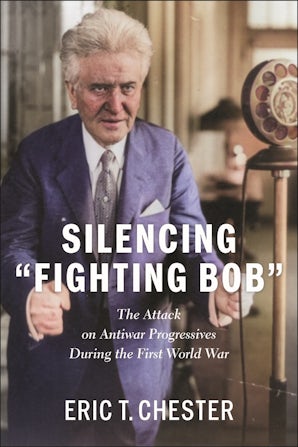New! “Silencing Fighting Bob: The Attack on Antiwar Progressives During the First World War” (Excerpt)

From: Chapter 3
“…As governor of Wisconsin, La Follette sought to defend the interests of the small farmer by pushing for greater regulation of the railroads. He successfully pushed through legislation that significantly increased taxes on railroad lines operating in Wisconsin. His effort to regulate railroad tariffs was less successful, since the state legislature created a commission with only limited power to set rates. Nevertheless, these were significant reforms benefiting farmers, who were convinced that the railroad companies charged extortionate rates on freight shipments. In the face of venomous attacks from mainstream newspapers, La Follette held to his plan to curb corporate power. As a result, he gained enormous popularity, along with the nickname “Fighting Bob.”
In spite of the intense hatred he evoked from the corporate establishment, La Follette was far from a radical. Wisconsin was also the home of the Milwaukee Socialist Party, a mainstay of its dominant social democratic wing. Led by Victor Berger, the Milwaukee socialists advanced a program of structural changes that moved well beyond the limited measures advocated by progressives. La Follette believed in the virtues of capitalism, a system based on privately owned corporations that produced goods and services that sought to maximize profits. La Follette sought to modify the system by breaking up monopoly trusts and regulating corporations to ensure that they did not engage in collusive agreements limiting competition. These were fundamental principles held by most progressive reformers.
In contrast to this perspective, Berger and the Milwaukee social democrats hoped to bring about a socialist society through a series of incremental reforms, such as bringing key industries into public ownership. Progressives and social democrats held two distinct and conflicting perspectives…..
From: The Conclusion
Within months after the United States entered the war, progressives and social democrats became the primary targets of repression. Unfortunately, far too often, they relied on the good faith of the authorities. Progressives scrambled to formulate a policy that was critical of the war effort but remained within the parameters set by the federal government in its interpretation of the broadly phrased wording of the Espionage Act. This choice proved to be risky since the guidelines kept shifting as the scope for permitted dissent became increasingly narrower. The progressive challenge to the administration’s war policies crumbled in the face of government repression.
There was an alternative to the hesitant stance taken by progressives. Eugene Victor Debs, the presidential candidate of the Socialist Party, demonstrated that through his actions. Debs and Senator Robert La Follette were highly respected and acted as the primary spokespersons for their respective political perspectives. In June 1918, Debs denounced the war in a speech delivered at a rally in Canton, Ohio, even though he knew he would likely be prosecuted. Debs was convicted of violating the Espionage Act and served two and a half years in a federal penitentiary. As a U.S. senator, La Follette was initially allowed a certain leeway. Nevertheless, he soon became the target of a coordinated attack involving much of the intelligence community. Under the impact of this assault, La Follette retreated into silence.
In no other period in U.S. history have fundamental constitutional rights been so drastically curtailed as they were during the First World War. Yet Woodrow Wilson was hardly a fervent ideologue. A pragmatic politician, his record before April 1917 was that of a mildly liberal Democratic Party centrist.
Nevertheless, once the United States entered the war, Wilson was prepared to authorize the ruthless suppression of the antiwar opposition, regardless of the flagrant violations of civil liberties that this entailed. Ideology is a less important explanation of dictatorial behavior than the threat posed by an organized opposition with a mass base of support.
…As the conflict unfolded, power became concentrated in the White House. Woodrow Wilson was certain that he and he alone should make every important decision concerning the course of the war. Anyone who challenged this would become a target of government repression.
….The experience of the United States during the First World War provides an object lesson of what is likely to occur when power is concentrated in the hands of one person. With this power, the president, through his control of the federal government’s agencies, can harass and suppress those who oppose his policies. He can do so openly and secretively. Even a century later, it is very difficult to determine exactly what Woodrow Wilson authorized, as well as the full extent of the covert operations undertaken by those within the intelligence community….”
Read more! Get your copy here.


